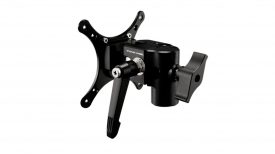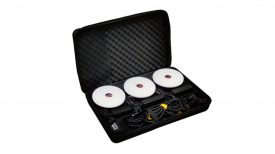The Xelmus Apollo 2x is a new range of anamorphic lenses that have been designed to be a more affordable option than say a Hawk V-Lite. With a growing appetite for anamorphic shooting, cinematographers are looking for lenses with unique characteristics.
Xelmus’ mission (sorry I couldn’t help the Apollo pun) is to provide cinematographers with the very best anamorphic lens experience. Xelmus is a young company that has only been around for 7 years. According to the company, they have tested out several anamorphic lenses over the years and come up with a lens that they believe is a good combination of optical performance and features.

When Xelmus started working on a design for the Apollo Series, their main goal was to create a lens that has a unique anamorphic look, that’s easy to use, and features a consistent design through all of the lenses. Xelmus researched and worked through known anamorphic optical system designs to come up with their penultimate product.
Focal lengths

There are 3 lenses in the series, a 40mm T2, 60mm T1.6, and a 100mm T2.9. While the lenses all feature a 95cm front filter diameter the T stop and image coverage varies. The 40mm T2 will only cover an image circle of 33mm, while the 60mm T1.6 and 100mm T2.9 cover image circles up to 50mm. All three lenses will cover the 4:3 open gate 23.76 x 17.89mm mode on the ARRI Alexa, as well as the 6:5 anamorphic shooting modes on the RED HELIUM 8K, GEMINI 5K, and MONSTRO 7K +.
The 60mm and 100mm will cover full frame sensors.
Flares

The Apollo series is claimed to be compact, sharp, and optimized for distortion correction. The biggest reason most cinematographers use anamorphic lenses is because of their unique characteristics, so Xelmus has been very careful to make sure that the lenses have interesting anamorphic flares. The company spent a lot of time testing different coatings to get the most desirable flares.
Anti-mump system

One of the main features of the Apollo lenses is the anti-mump system created in 1954 by Mr. Gottschalk from Panavision. The way the anti-mump system works is that when you are focusing from infinity to the closest focusing point, the image stretches only in a vertical direction (vertical breathing), while the horizontal axis stays locked. That’s how the focusing system works on the Apollo series.
Optics

The optics used in the Apollo lenses are much smaller than those found in a front variable diopters design system. This means the Apollo lenses are lighter, have less chromatic aberration, and have better light transmission. Xelmus have managed to keep the length of the Apollo lenses much shorter in comparison to most other anamorphic lenses on the market. This makes the Apollo lenses perfect for use on Steadicams, gimbals, drones, and for handheld work.

Xelmus found that another benefit of using the anti-mump system was that they were able to decrease the minimum focus distance to below 1 foot. This is very unusual for an anamorphic lens. All 3 focal length focus at a ridiculously close 25cm (9.85″).

The Focus ring mechanics are a cam based design. They allow for a smooth focus rotation of 270°. The lenses feature a standard pitch module of 0.8 for both focus and aperture rings.
Color

The Apollo lenses are white in homage to NASA and the space program.
Competition

There are lots of 2x anamorphic lenses available, but when it comes to independent anamorphic lens manufacturers, Atlas Lenses looks to be the main competition. Atlas has 6 lenses in their Orion series and they retail for between $7,999 – $8,999 USD per lens.
Cost and availability

You can preorder the lenses through the companies website by paying 50% of the total price (all deposits are refundable). The cost of the individual focal lengths is $11,999 USD per lens. The 3 lens set is $35,997 USD. All orders made before April 2019 will be shipped out in October 2019.





